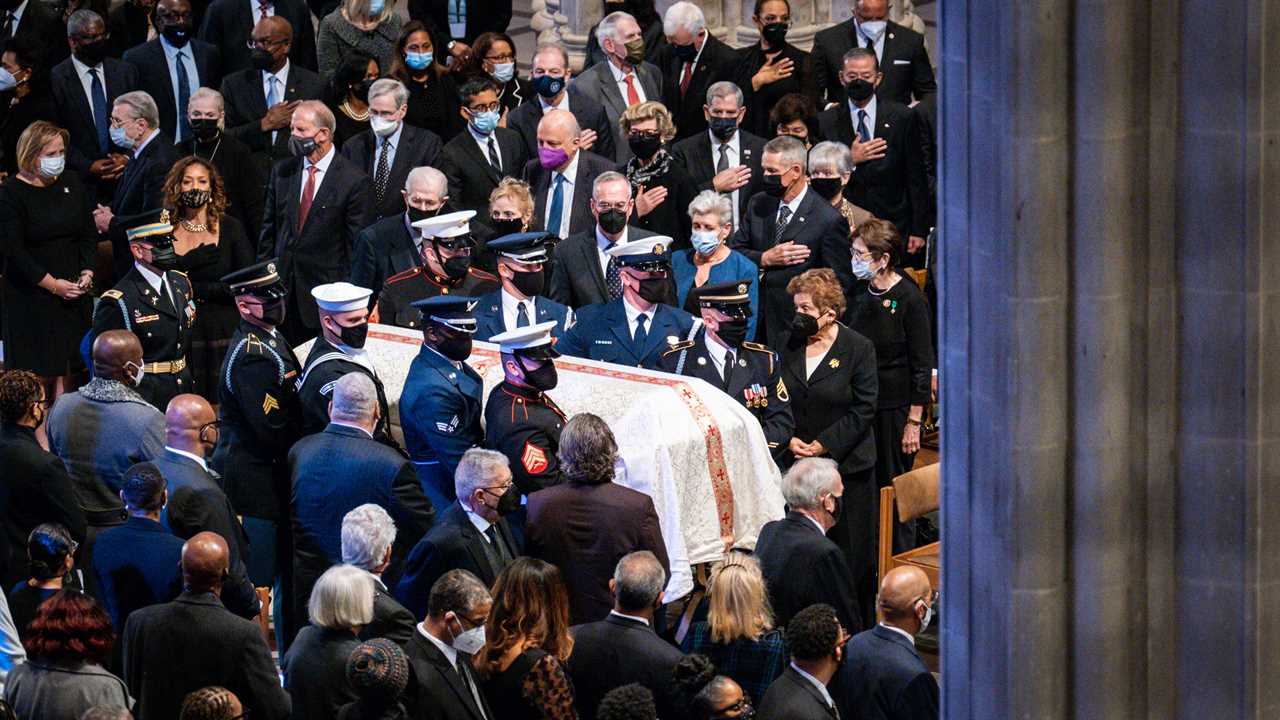
The funeral for Colin L. Powell, former secretary of state, chairman of the Joint Chiefs of Staff and national security adviser, brought out a Washington that barely exists anymore: Republicans and Democrats, including President Biden and two of his predecessors, uniformed military and diplomats, and people on all sides of the Iraq war.
No one would have been more amused by the turnout than Mr. Powell himself, who often ran a smiling, half-whispered, commentary on the city’s temporary loyalties and back room machinations. Yet on Friday, the Washington National Cathedral was filled with them all — former officials who were at Mr. Powell’s side in the Persian Gulf War and on the seventh floor of the State Department, where he often waged a behind-the-scenes battle for influence in the Bush White House.
Mr. Biden did not speak, nor did the two former presidents who attended, Barack Obama, whom Mr. Powell endorsed during the 2008 campaign, and George W. Bush, who made Mr. Powell his first secretary of state. Instead, among the eulogists was a Democrat who had often clashed with Mr. Powell over the general’s reluctance to commit American forces to battles for which the general, seared by the experience of his service in Vietnam, did not see a clear, successful outcome.
“He said I almost gave him an aneurysm,” the Democrat, Madeleine Albright, who served as secretary of state in the Clinton administration, told the mourners, recalling Mr. Powell’s reaction after she famously asked him, “What’s the point of having this superb military you’re always talking about if we can’t use it?”
They argued and argued, and the argument delayed the American intervention in Bosnia.
But over time they also became the close friends, which became critical after the disputed 2000 election. When Mr. Powell was named her successor, she said, he drove over to her house in Georgetown, walked in the door and together they began planning a succession — something that did not happen twenty years later, when, paralyzed by President Donald J. Trump’s refusal to admit his defeat, the Trump administration resisted a cooperative handover of power. (Mr. Trump, who denounced Mr. Powell a day after he died, was not present at the ceremony, and not mentioned.)
“He made pragmatism charismatic,” Ms. Albright said of Mr. Powell.
Throughout the ceremony, there were many such stories from a seemingly lost Washington, as participants told the story of how a son of Jamaican parents grew up in the Bronx, had his life given meaning in the Army, and rose through the ranks serving presidents of both parties. It was what his son, Michael K. Powell, a former chairman of the Federal Communications Commission, called a true “American journey,’’ a phrase drawn from the title of Mr. Powell’s autobiography.
Even the scene of the funeral itself seemed a rare celebration of a figure whose party affiliations seemed far less interesting, and less concrete, than his approach to war, diplomacy and problem-solving. The National Cathedral is traditionally the site of presidential funerals — Ronald Reagan’s was held there, along with George H.W. Bush’s — but only rarely for other notable figures, including Senator John McCain, who died in 2018.
Mr. Powell’s ability to lead — whether he was in charge of troops or the diplomatic corps — was recalled by Richard Armitage, who served alongside him in Vietnam, became his closest friend and his deputy secretary of state. “One day I asked General Powell what is the secret of leadership,” Mr. Armitage recalled.
“You see some people, they look great,” he recalled Mr. Powell saying, with their impressive uniforms. “But the fact of the matter is that they can’t lead a horse to water.”
“You see some people who look like an unmade bed,’’ he continued. “But they can lead people anywhere.”
Did you miss our previous article...
https://trendinginthenews.com/usa-politics/some-sept-11-trial-secrets-may-not-be-secrets-anymore






